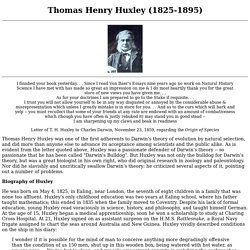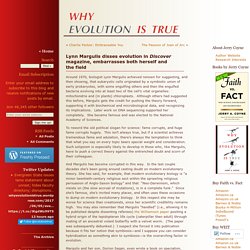

Córtex com Antonio Nobre. Mudança Climática e o Fim do Mundo Materialista. Thomas Huxley. Thomas Henry Huxley was one of the first adherents to Darwin's theory of evolution by natural selection, and did more than anyone else to advance its acceptance among scientists and the public alike.

Thomas Henry Huxley. Thomas Henry Huxley, (born May 4, 1825, Ealing, Middlesex, England—died June 29, 1895, Eastbourne, Sussex), English biologist, educator, and advocate of agnosticism (he coined the word).

Huxley’s vigorous public support of Charles Darwin’s evolutionary naturalism earned him the nickname “Darwin’s bulldog,” while his organizational efforts, public lectures, and writing helped elevate the place of science in modern society. Student life Thomas Henry Huxley, born above a butcher’s shop, was the youngest of the six surviving children of schoolmaster George Huxley and his wife, Rachel. Although Huxley received only two years (1833–35) of formal education at his father’s declining Ealing School, its evangelicalism later marked his scientific rhetoric. From 1835 his father tried managing a bank in his native Coventry, which left Huxley footloose in the ribbon-weaving city. The end of science: facing the limits of knowledge in the twilight of the scientific age the twilight of the scientific age. As Above, So Below: The Worldview of Lynn Margulis. Book Review: The Limits of Science by Peter Medawar. The Limits of Science I can’t remember where it was that I first saw this referenced.

It took a little bit of finding, as I could not find it print in any major bookstore either on the high street or online. Lynn Margulis disses evolution in Discover magazine, embarrasses both herself and the field. Around 1970, biologist Lynn Margulis achieved renown for suggesting, and then showing, that eukaryotic cells originated by a symbiotic union of early prokaryotes, with some engulfing others and then the engulfed bacteria evolving into at least two of the cell’s vital organelles: mitochondria and (in plants) chloroplasts.

Although others had suggested this before, Margulis gets the credit for pushing the theory forward, supporting it with biochemical and microbiological data, and recognizing its implications. Later work on DNA sequencing supported her completely. She became famous and was elected to the National Academy of Sciences. To reword the old political slogan for science: fame corrupts, and huge fame corrupts hugely. This isn’t always true, but if a scientist achieves tremendous fame and adulation, there’s always the temptation to think that what you say on every topic bears special weight and consideration. And Margulis has become corrupted in this way. This is insane. A cientista que mudou as regras da evolução da vida. Lynn Margulis, Neo-Darwinism, And Kin Selection. Professor Lynn Margulis is the biologist who had the incredible insight that the cells of modern organisms were originally formed by the symbiotic combination of prokaryotic cells and colonies of bacteria, and then had to battle for years to have this recognised by the science community.

The idea is so outlandish, but so significant, that it puts her right up there as one of the greats of biology. We owe a huge debt to Margulis, but it’s not only for this that we owe her. Margulis has described neo-Darwinism as; "a minor twentieth century religious sect within the sprawling religious persuasion of Anglo-Saxon Biology" and believes that her opponents "wallow in their zoological, capitalistic, competitive, cost-benefit interpretation of Darwin—having mistaken him.”
Isn’t this great!? Córtex com Antonio Nobre. Mudança Climática e o Fim do Mundo Materialista. The End Of Science: Facing The Limits Of Knowledge In The Twilight Of The Scientific Age (9780465065929): John Horgan: Books. R.I.P. Lynn Margulis, Biological Rebel - Scientific American Blog Network. The biologist Lynn Margulis died on November 22 at the age of 73.

I adapted the following essay about her from my 1996 book The End of Science. Lynn Margulis was among the most creative challengers of mainstream Darwinian thinking of the late 20th century. She challenged what she called "ultra-Darwinian orthodoxy" with several ideas. The first, and most successful, is the concept of symbiosis. Darwin and his heirs had always emphasized the role that competition between individuals and species played in evolution. Lynn Margulis 1938-2011 "Gaia Is A Tough Bitch" Ed RegisScience writer; Author, What Is Life?

The best epitaph for Lynn Margulis probably consists of her own words, from a Discover magazine Q&A with her, published earlier this year: Q: Do you ever get tired of being called controversial? A: I don’t consider my ideas controversial. I consider them right. Margulis-Dawkins Debate. The underground lecture hall of Balliol College in the University of Oxford was already full.

In fact, people were queuing all the way up the staircase, ears alert to hear the intellectual explosions as the two titans of evolutionary theory faced each other in debate. Richard Dawkins on one side, champion since writing The Selfish Gene in 1976 of the neo-Darwinist view that evolution happens via accumulation of random mutations in DNA, followed by natural selection. Ron Vale (UCSF, HHMI) 1: Molecular Motor Proteins. Jack Szostak (Harvard/HHMI) Part 3: Non-enzymatic Copying of Nucleic Acid Templates. Jack Szostak (Harvard/HHMI) Part 1: The Origin of Cellular Life on Earth. Hazyskies. What Color is Your Sky? - MY NASA DATA. Project Ideas: 1.

Make a Sky Photo Calendar. A digital camera is ideal for making a daily record of sky color. A photographic record of sky color has real scientific value, especially if it covers a long period of time. For best results, each day photograph the same area of the sky at about the same time. When you save the photos in a computer, assign each one with its date. Save all your sky photos in a folder labeled with the year you made them. Tip: Try to use a camera with a time stamp feature that places the date and time on each photo.Related Picture Post Project 2. You can easily prove that the blue light in the flashlight beam is scattered more than the red light by following the beam of the flashlight as it travels through the milky water. You can use a white card to follow the beam from the flashlight side of the tray to the opposite side. Tip: An older flashlight with an incandescent bulb works better than a newer flashlight with a light-emitting diode (LED). 3. 4.
Evolução das plantas e a conquista do ambiente terrestre.
Porque você tem que tirar os sapatos antes de entrar na minha casa — tudo sobre minha mãe. Um dos melhores hábitos que adquiri morando na Alemanha foi o de não usar mais sapatos da rua em casa.

A primeira vez que tive contato com essa prática foi há 13 anos quando eu ainda morava em Barcelona, cheguei numa festa na casa de uns suecos, toda produzida e pimba! Foi só dar um passos para dentro de casa que o anfitrião pediu para eu literalmente descer do salto. Logo me dei conta que aquele negócio de tirar os sapatos não era só uma mania de sueco louco, todos meus amigos da Europa do norte tinham o mesmo costume. Quando deixei a vida de estudante na Espanha e me mudei para Alemanha percebi rápido que a prática de tirar os sapatos ia me poupar muito trabalho na vida. Em uma casa onde sapato da rua não entra, uma vassoura faz milagres.